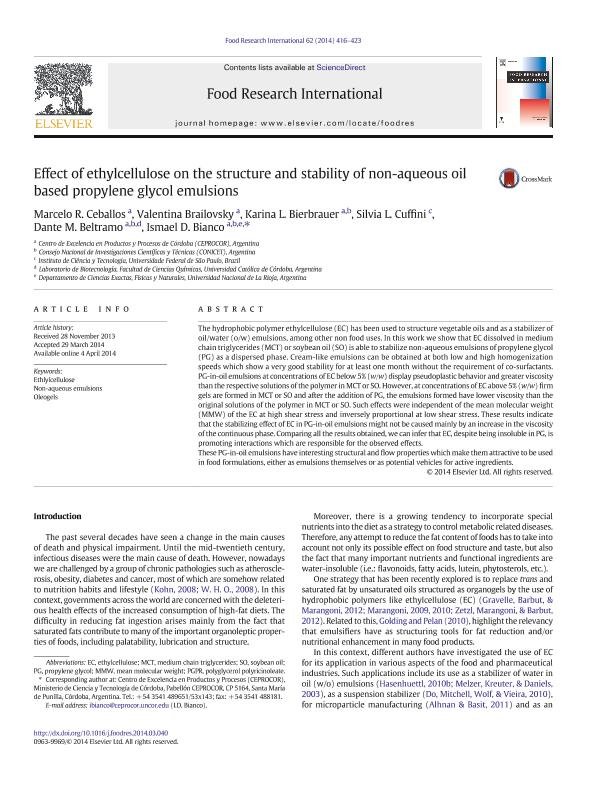Artículo
Effect of ethylcellulose on the structure and stability of non-aqueous oil based propylene glycol emulsions
Ceballos, Marcelo Ramon; Brailovsky, Valentina; Bierbrauer, Karina Lilian ; Cuffini, Silvia Lucia
; Cuffini, Silvia Lucia ; Beltramo, Dante Miguel
; Beltramo, Dante Miguel ; Bianco, Ismael Dario
; Bianco, Ismael Dario
 ; Cuffini, Silvia Lucia
; Cuffini, Silvia Lucia ; Beltramo, Dante Miguel
; Beltramo, Dante Miguel ; Bianco, Ismael Dario
; Bianco, Ismael Dario
Fecha de publicación:
04/2014
Editorial:
Elsevier Science
Revista:
Food Research International
ISSN:
0963-9969
Idioma:
Inglés
Tipo de recurso:
Artículo publicado
Clasificación temática:
Resumen
The hydrophobic polymer ethylcellulose (EC) has been used to structure vegetable oils and as a stabilizer of oil/water (o/w) emulsions, among other non food uses. In this work we show that EC dissolved in medium chain triglycerides (MCT) or soybean oil (SO) is able to stabilize non-aqueous emulsions of propylene glycol (PG) as a dispersed phase. Cream-like emulsions can be obtained at both low and high homogenization speeds which show a very good stability for at least one month without the requirement of co-surfactants. PG-in-oil emulsions at concentrations of EC below 5% (w/w) display pseudoplastic behavior and greater viscosity than the respective solutions of the polymer in MCT or SO. However, at concentrations of EC above 5% (w/w) firm gels are formed in MCT or SO and after the addition of PG, the emulsions formed have lower viscosity than the original solutions of the polymer in MCT or SO. Such effects were independent of the mean molecular weight (MMW) of the EC at high shear stress and inversely proportional at low shear stress. These results indicate that the stabilizing effect of EC in PG-in-oil emulsions might not be caused mainly by an increase in the viscosity of the continuous phase. Comparing all the results obtained, we can infer that EC, despite being insoluble in PG, is promoting interactions which are responsible for the observed effects. These PG-in-oil emulsions have interesting structural and flow properties which make them attractive to be used in food formulations, either as emulsions themselves or as potential vehicles for active ingredients.
Palabras clave:
Ethlylcellulose
,
Non-Aqueous Emulsions
,
Oleogels
Archivos asociados
Licencia
Identificadores
Colecciones
Articulos(CCT - CORDOBA)
Articulos de CTRO.CIENTIFICO TECNOL.CONICET - CORDOBA
Articulos de CTRO.CIENTIFICO TECNOL.CONICET - CORDOBA
Citación
Ceballos, Marcelo Ramon; Brailovsky, Valentina; Bierbrauer, Karina Lilian; Cuffini, Silvia Lucia; Beltramo, Dante Miguel; et al.; Effect of ethylcellulose on the structure and stability of non-aqueous oil based propylene glycol emulsions; Elsevier Science; Food Research International; 62; 4-2014; 416-423
Compartir
Altmétricas



